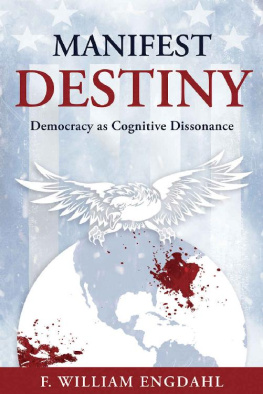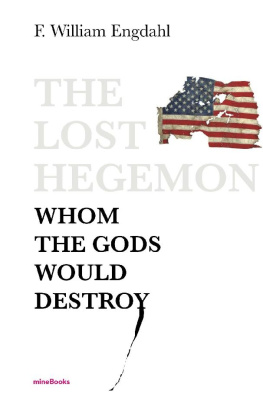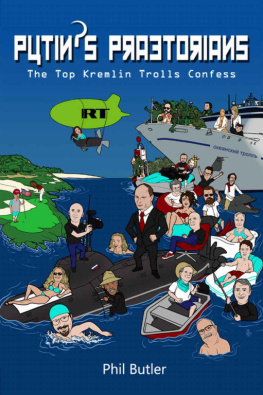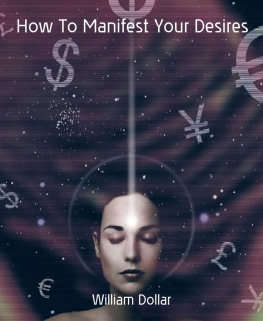F. William Engdahl - Manifest Destiny: Democracy as Cognitive Dissonance
Here you can read online F. William Engdahl - Manifest Destiny: Democracy as Cognitive Dissonance full text of the book (entire story) in english for free. Download pdf and epub, get meaning, cover and reviews about this ebook. year: 0, genre: History. Description of the work, (preface) as well as reviews are available. Best literature library LitArk.com created for fans of good reading and offers a wide selection of genres:
Romance novel
Science fiction
Adventure
Detective
Science
History
Home and family
Prose
Art
Politics
Computer
Non-fiction
Religion
Business
Children
Humor
Choose a favorite category and find really read worthwhile books. Enjoy immersion in the world of imagination, feel the emotions of the characters or learn something new for yourself, make an fascinating discovery.
- Book:Manifest Destiny: Democracy as Cognitive Dissonance
- Author:
- Genre:
- Year:0
- Rating:3 / 5
- Favourites:Add to favourites
- Your mark:
- 60
- 1
- 2
- 3
- 4
- 5
Manifest Destiny: Democracy as Cognitive Dissonance: summary, description and annotation
We offer to read an annotation, description, summary or preface (depends on what the author of the book "Manifest Destiny: Democracy as Cognitive Dissonance" wrote himself). If you haven't found the necessary information about the book — write in the comments, we will try to find it.
Manifest Destiny: Democracy as Cognitive Dissonance — read online for free the complete book (whole text) full work
Below is the text of the book, divided by pages. System saving the place of the last page read, allows you to conveniently read the book "Manifest Destiny: Democracy as Cognitive Dissonance" online for free, without having to search again every time where you left off. Put a bookmark, and you can go to the page where you finished reading at any time.
Font size:
Interval:
Bookmark:
MANIFEST DESTINY
DEMOCRACY AS COGNITIVE DISSONANCE
MANIFEST DESTINY
DEMOCRACY AS COGNITIVE DISSONANCE
F. WILLIAM ENGDAHL
mine.Books
Wiesbaden
Copyright 2018 by F. William Engdahl
The rights of F. William Engdahl to be identified as the author of this work have been asserted by him in accordance with the Copyright Laws of the United States of America and the UK Copyright, Designs and Patents Act 1988.
No part of this book may be reproduced or transmitted in any form or by means, electronic, mechanical, photocopying, recording, or otherwise, without prior written permission of the publisher and author.
Library of Congress cataloging in Publication Data applied for.
ISBN: 978-3-9817237-3-1
Published by: mine.Books, Strasse der Republik 17, 65203 Wiesbaden, Germany www.williamengdahl.com
Cover design: Jason Orr
To Larisa
CONTENTS
AUTHORS INTRODUCTION:
Freedom is Slavery: Destroying Nations in the Name of Democracy
CHAPTER ONE:
Doing What the CIA Did, but Privately...
CHAPTER TWO:
A Pope, the NED and Poland Shock Therapy
CHAPTER THREE:
The Rape of Russia: The CIAs Yeltsin Coup dtat
CHAPTER FOUR:
Soros and the Harvard Boys Join Yeltsin and the KGB
CHAPTER FIVE:
The CIA, NGOs and the Myth of Tiananmen
CHAPTER SIX:
Washington and Their NGOs Disintegrate Yugoslavia
CHAPTER SEVEN:
Otpor! Fake Democracy in Serbia
CHAPTER EIGHT:
A Cold War Ended Not
CHAPTER NINE:
NATO Banging on Moscows Door: Georgia and Ukraine Color Revolutions Shake Russia
CHAPTER TEN:
The Middle East: Where the Prize Ultimately Lies
CHAPTER ELEVEN:
Arab Spring, Gold Dinars and Energy Wars
AFTERWORD:
Endless Wars for Democracy...
AUTHORS INTRODUCTION:
Freedom is Slavery: Destroying Nations in the Name of Democracy
In 1945, British writer and social critic George Orwell wrote a book titled 1984 on the theme of a fictional totalitarian society . The book, one of the most successful in publishing history, relates the aftermath of an atomic world war in which the world is partitioned into three states. One state, Oceania, whose capital is London, is ruled by an English Socialist Party that has total control over all its citizens, especially over their minds. The central mind-control program used to keep its citizens abject and obedient mind slaves was referred to as doublethink.
In doublethink, subjects were submitted to two contradictory concepts, both of which they must accept as correct simultaneously, termed by psychologists cognitive dissonance. So, although Oceania is constantly at war, its citizens act as if there is peace too. The essence of the doublethink is summarized by Orwell at the beginning of the novel:
War is peace.
Freedom is slavery.
Ignorance is strength.
In the following work I chronicle what, in truth, is an adaptation of Orwells doublethink which might be termed democracy as cognitive dissonance. Its the chronicle of one of the most destructive and one of the most effective operations by the intelligence services of any modern state, including of that of Stalins Soviet Union or even Hitlers Goebbels-steered Third Reich. Its the chronicle of a vast project developed by US intelligence services over decades, going back to the May 1968 CIA student strikes that brought down French President Charles de Gaulle, a determined foe of American global domination.
The Cold War between the countries of NATO and those allied to the Soviet Union lasted nearly a half century. Finally, exhausted and economically in dire straits, the Soviet Union, under Mikhail Gorbachev, raised a white flag of surrender in November 1989, as Moscow let the Berlin Wall fall. The wall had become the symbol of what Winston Churchill, in his famous 1946 Fulton, Missourispeech, called the Iron Curtain dividing the West--the Free World as Washington propaganda was fond of ever repeating--from the communist world dominated by Moscow.
Outside a small circle of US CIA, State Department, and Pentagon senior officials, together with their allies in select Washington think tanks, such as the American Enterprise Institute or the New York Council on Foreign Relations, what few realized was that Washington was about to unleash the most concerted effort at regime change across the former communist countries of Eastern Europe, Ukraine, and the newly formed Russian Federation itself. The rallying call was the introduction of US-style democracy, freedom, human rights, a neo-liberal free market. It was to become a tyranny and in some cases, such as Ukraine, it would be far worse than anything experienced under the Soviet regime.
The Washington regime-change operations came to be called color revolutions because of the distinct Madison Avenue color-logo themes each destabilization brought with itthe Orange Revolution in Ukraine, the Rose Revolution in Georgia, the Green Revolution in Iran, and so forth. Invariably, they targeted any significant nation that stood in the way of what David Rockefeller, in his Memoirs , referred to as a one-world government or Bill Clinton, in the 1990s, referred to by the innocent-sounding term but not-so-innocent process of corporate globalization.
In truth, what those Washington color revolution regime-change interventions represented was an attempt to replace former communist leaders with handpicked, Washington-corrupted political leaders who would be willing to sell their national crown jewels and their people to select Western financial predators, such as the billionaire speculator George Soros or Western bankers and multinational corporations.
The Aura of American Power
Ironically, the greatest challenge confronting Washington, the Pentagon, the CIA, and the powerful militaryindustrial and banking lobby groups, who control congressmen and presidents with their money, was the end of the active Cold War in late 1989. There was suddenly no enemy to justify continued vast US military spending or the existence of NATO.
James R. Schlesinger, former US defense secretary and later CIA director, described the dilemma: American policymakers should be quite clear in their own minds that the basis for determining US force structure and military expenditures in the future should not simply be the response to individual threats, but rather that which is needed to maintain the overall aura of American power.
At the end of the 1980s, the economy and financial system of the US was in the throes of its deepest crisis since the Great Depression. The largest banks of Wall StreetCitigroup, Bank of America, and otherswere technically bankrupt. The deregulation of US Savings & Loan banks had led to a real estate speculation bubble that collapsed in the late 1980s, at the same time as a dramatic fall in world oil prices led to waves of bankruptcies across the US domestic oil industry.
To demand that US taxpayers continue to waste hundreds of billions of their tax dollars on high levels of defense spending for an enemy that could no longer be identified, rather than to create a peace dividend that would allow those billions to go to the renewal of Americas rapidly decaying economic infrastructure, was a challenge to the US military and intelligence establishment. Chairman of the Joint Chiefs of Staff Colin Powell told Army Times in April 1991: Think hard about it, Im running out of demons. Im running out of villains... Im down to Castro and Kim Il Sung.
That dilemma was soon to be resolved. Rather than solely relying on military overt force to advance its global agenda, Washington unveiled a dramatic new weapon: fake democracy nongovernmental organizations (NGOs) that would be used to covertly create pro-Washington regimes in strategic parts of the world after the collapse of the Soviet Union. Democratic freedom would be the banner, incredibly enough, to introduce a new tyranny: free markets in actual fact controlled by Wall Street and European global banks, as well as Western multinational corporations that would loot the vast state-owned resources of the collapsed communist world.
Next pageFont size:
Interval:
Bookmark:
Similar books «Manifest Destiny: Democracy as Cognitive Dissonance»
Look at similar books to Manifest Destiny: Democracy as Cognitive Dissonance. We have selected literature similar in name and meaning in the hope of providing readers with more options to find new, interesting, not yet read works.
Discussion, reviews of the book Manifest Destiny: Democracy as Cognitive Dissonance and just readers' own opinions. Leave your comments, write what you think about the work, its meaning or the main characters. Specify what exactly you liked and what you didn't like, and why you think so.








